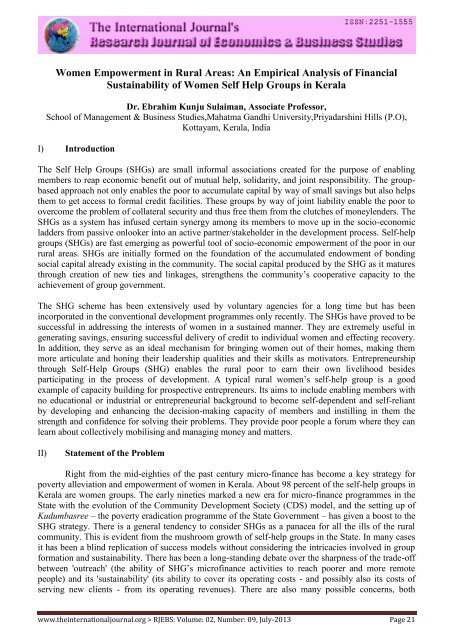Research Journal of Economics & Business Studies - RJEBS - The ...
Research Journal of Economics & Business Studies - RJEBS - The ...
Research Journal of Economics & Business Studies - RJEBS - The ...
You also want an ePaper? Increase the reach of your titles
YUMPU automatically turns print PDFs into web optimized ePapers that Google loves.
Women Empowerment in Rural Areas: An Empirical Analysis <strong>of</strong> Financial<br />
Sustainability <strong>of</strong> Women Self Help Groups in Kerala<br />
Dr. Ebrahim Kunju Sulaiman, Associate Pr<strong>of</strong>essor,<br />
School <strong>of</strong> Management & <strong>Business</strong> <strong>Studies</strong>,Mahatma Gandhi University,Priyadarshini Hills (P.O),<br />
Kottayam, Kerala, India<br />
I) Introduction<br />
<strong>The</strong> Self Help Groups (SHGs) are small informal associations created for the purpose <strong>of</strong> enabling<br />
members to reap economic benefit out <strong>of</strong> mutual help, solidarity, and joint responsibility. <strong>The</strong> groupbased<br />
approach not only enables the poor to accumulate capital by way <strong>of</strong> small savings but also helps<br />
them to get access to formal credit facilities. <strong>The</strong>se groups by way <strong>of</strong> joint liability enable the poor to<br />
overcome the problem <strong>of</strong> collateral security and thus free them from the clutches <strong>of</strong> moneylenders. <strong>The</strong><br />
SHGs as a system has infused certain synergy among its members to move up in the socio-economic<br />
ladders from passive onlooker into an active partner/stakeholder in the development process. Self-help<br />
groups (SHGs) are fast emerging as powerful tool <strong>of</strong> socio-economic empowerment <strong>of</strong> the poor in our<br />
rural areas. SHGs are initially formed on the foundation <strong>of</strong> the accumulated endowment <strong>of</strong> bonding<br />
social capital already existing in the community. <strong>The</strong> social capital produced by the SHG as it matures<br />
through creation <strong>of</strong> new ties and linkages, strengthens the community’s cooperative capacity to the<br />
achievement <strong>of</strong> group government.<br />
<strong>The</strong> SHG scheme has been extensively used by voluntary agencies for a long time but has been<br />
incorporated in the conventional development programmes only recently. <strong>The</strong> SHGs have proved to be<br />
successful in addressing the interests <strong>of</strong> women in a sustained manner. <strong>The</strong>y are extremely useful in<br />
generating savings, ensuring successful delivery <strong>of</strong> credit to individual women and effecting recovery.<br />
In addition, they serve as an ideal mechanism for bringing women out <strong>of</strong> their homes, making them<br />
more articulate and honing their leadership qualities and their skills as motivators. Entrepreneurship<br />
through Self-Help Groups (SHG) enables the rural poor to earn their own livelihood besides<br />
participating in the process <strong>of</strong> development. A typical rural women’s self-help group is a good<br />
example <strong>of</strong> capacity building for prospective entrepreneurs. Its aims to include enabling members with<br />
no educational or industrial or entrepreneurial background to become self-dependent and self-reliant<br />
by developing and enhancing the decision-making capacity <strong>of</strong> members and instilling in them the<br />
strength and confidence for solving their problems. <strong>The</strong>y provide poor people a forum where they can<br />
learn about collectively mobilising and managing money and matters.<br />
II)<br />
Statement <strong>of</strong> the Problem<br />
Right from the mid-eighties <strong>of</strong> the past century micro-finance has become a key strategy for<br />
poverty alleviation and empowerment <strong>of</strong> women in Kerala. About 98 percent <strong>of</strong> the self-help groups in<br />
Kerala are women groups. <strong>The</strong> early nineties marked a new era for micro-finance programmes in the<br />
State with the evolution <strong>of</strong> the Community Development Society (CDS) model, and the setting up <strong>of</strong><br />
Kudumbasree – the poverty eradication programme <strong>of</strong> the State Government – has given a boost to the<br />
SHG strategy. <strong>The</strong>re is a general tendency to consider SHGs as a panacea for all the ills <strong>of</strong> the rural<br />
community. This is evident from the mushroom growth <strong>of</strong> self-help groups in the State. In many cases<br />
it has been a blind replication <strong>of</strong> success models without considering the intricacies involved in group<br />
formation and sustainability. <strong>The</strong>re has been a long-standing debate over the sharpness <strong>of</strong> the trade-<strong>of</strong>f<br />
between 'outreach' (the ability <strong>of</strong> SHG’s micr<strong>of</strong>inance activities to reach poorer and more remote<br />
people) and its 'sustainability' (its ability to cover its operating costs - and possibly also its costs <strong>of</strong><br />
serving new clients - from its operating revenues). <strong>The</strong>re are also many possible concerns, both<br />
www.theinternationaljournal.org > <strong>RJEBS</strong>: Volume: 02, Number: 09, July-2013 Page 21
















